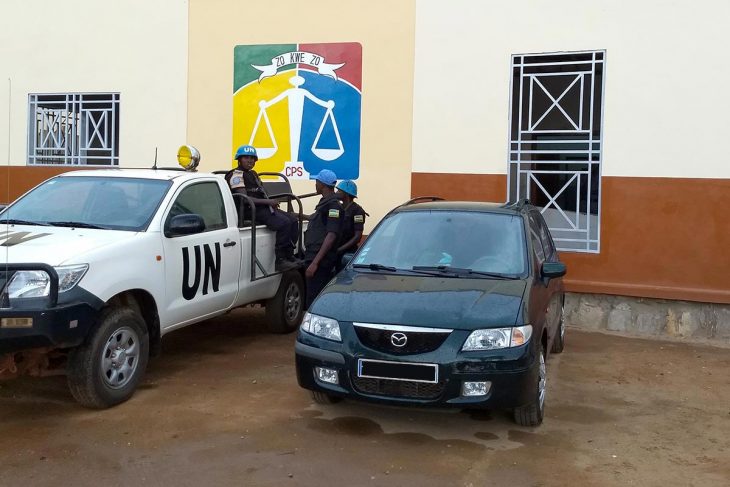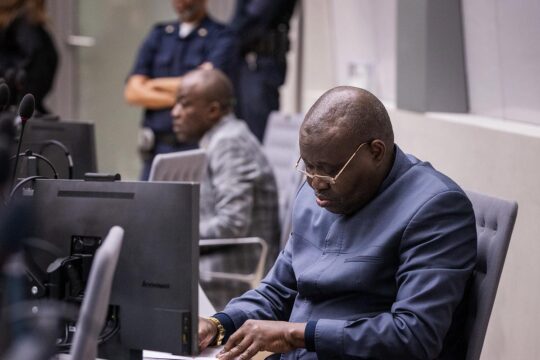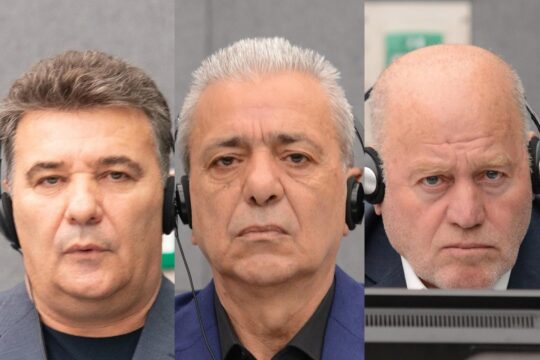In the big, brand new courtroom, workers are laying the last tiles and putting the finishing touches. Not far away, the new two-storey administrative building with some 60 air-conditioned offices has been completed. In terms of equipment, the Special Criminal Court (SCC) is now finally operational, five years after the 3 June 2015 law that created it.
So it was timely for the Court when it announced in a May 25 press release, that it was taking over the files of nine combatants arrested a few days earlier after attacks in the south-eastern Obo region. The nine are presumed to belong to the armed group led by Ali Darassa, the Union for Peace in the Central African Republic (UPC). And a few days earlier, the UN mission MINUSCA had announced the arrest of nine other militiamen in Ndélé, in the north, also handed over to the SCC. The 18 new detainees, once transferred to Bangui, will be held in cells newly rehabilitated by the Court’s two main donors - UNDP and MINUSCA - at the central prison of Camp de Roux.
“The SCC has woken up”
Civil society is enthusiastic. Carine Fornel Poutou, president of the Central African Association of Women Lawyers, is pleased. "It was what we wanted,” she says. “When we learned of the arrests in Ndélé and Obo, it was a relief. We had to get our hands on these executioners!" Joseph Bindoumi, President of the Central African League for Human Rights, adds: "It’s true we were afraid at one point that the SCC would follow the example of the International Criminal Court, which is dragging its feet on some cases, meaning that there is no longer a direct relationship between the crimes committed and the legal response." For Mathias Morouba, his counterpart at the Central African Human Rights Observatory, "the SCC has just woken up, but it has taken a long time”.
Created after the Bangui Forum, which stressed the need to combat impunity, this mixed jurisdiction responsible for judging the perpetrators of the most serious crimes committed since 2003 had raised real hopes. Five years later and still with no trials, unlike the ordinary courts, hope has faded for many Central Africans. At the beginning of May, the SCC indicated it had eight investigations under way, eight cases under examination and three people in preventive detention, after only one and a half years of real judicial work. For the year 2020, its projected annual operating budget is 15.8 million dollars. However, the Court, which has no guaranteed long-term structural funding, reportedly still needs to find 58 million to ensure its functioning over the next three years.

But these delays in implementation can be explained, argues the Deputy Special Prosecutor of the Court, Alain Ouaby Bekaï. "It was necessary to recruit judges and staff, find funding, and above all, there was a lack of legal instruments, such as the Rules of Procedure and Evidence, which is our Bible." These Rules were adopted by the National Assembly on 2 July 2018. “We launched the first preliminary investigations in January 2019," he adds. “And by 2021, we hope to have arrest warrants, new arrests, and develop cooperation with the ordinary courts for the filing of complaints in the provinces.”
Last May the SCC announced a further postponement of its first hearings, now scheduled for early 2021. “Even the Court is not spared by Covid-19," says the Deputy Special Prosecutor. “We have tried to adapt our activities to the government's regulations. Investigations are continuing, hearings are taking place, but not as quickly as before." He cites difficulties in travelling to the field, but also the impossibility for international judges to come to Bangui.
Repeated violations of the Khartoum Agreement
In recent months, violations of the peace agreement reached in February 2019 in Khartoum have multiplied, resulting in dozens of victims and thousands of displaced persons. For Carine Fournel, these five years without any real tangible results or arrests by the SCC have encouraged the continuation of crimes. “If there had been sanctions, these executioners would not be continuing to abuse the population," she says. “That's because there was no justice. These [new] arrests are a way of warning other perpetrators to stop what they are doing, otherwise the judicial hammer will fall on them.”
So will these arrests, linked to recent events whereas the SCC was set up to deal with serious crimes committed since 2003, set an example and promote the implementation of the peace agreement? "It’s a question of going for cases where the collection of evidence will be simplest," replied Prosecutor Bekaï. “Facts dating back to 2003 are not being forgotten but since there are choices to be made, we believe that in more recent cases we will have the opportunity to collect evidence more easily than those dating back to 2003, which require more work.”
SCC’s pragmatism
According to Pierre Brunisso, an international criminal lawyer and former head of mission for FIDH in the Central African Republic, "by taking up the case concerning the violence in Obo, the Court is showing pragmatism. It can take advantage of the FACA [Central African Armed Forces] deployment to investigate on the ground and put an end to the impunity ravaging the south-east of the country. This should not prevent it from dealing with older cases. Prosecutors cannot ignore past massacres, such as those in Bangassou or Alindao."
There is an even more uncomfortable question, namely the impunity for armed group leaders, some of whom are an integral part of the government under the peace agreement. This is the case of UPC leader Darassa, who is military adviser to the Prime Minister with the rank of minister. The nine militiamen arrested in Obo would have been under his command. But, he said in a statement on 20 May, "the UPC is in no way involved in the exactions and fighting in Obo. It is the civilian population that has taken action in response to the abuses of the FACA in the area.”
“Small fry that MINUSCA hands on a platter”
For Gervais Lakosso, coordinator of the Civil Society Working Group, a political opposition movement, these Obo arrests are a "drop in the ocean". He says Ali Darassa "must be arrested, or one of his top lieutenants, in order for the case to become serious, someone whose arrest could worry the group. These nine men, among the thousands of others he has, are nothing." Lakosso, for his part, believes "there must be political will to ask MINUSCA to arrest these people. If there was the political will to stop these abuses, then they we would stop. It’s incomprehensible".
An African lawyer working at MINUSCA goes further: "The SCC is forced to make do with the small fry that MINUSCA hands on a platter. The SCC cannot take issue with the international community which, through the Khartoum Agreement, has granted a kind of impunity to the main perpetrators of the crimes. The SCC won’t touch them unless the sponsors in Khartoum allow it. This is where the ICC should play a role.
“Was it MINUSCA that told the SCC, 'we have just arrested criminals, start prosecuting'?” asks the UN official, who wishes to remain anonymous. “That can’t be ruled out, just as we can't rule out the possibility that the SCC jumped on the bandwagon and said 'here we are and we are at work'".
Risk of misinterpretation on the ground
According to Igor Acko, a Central African sociologist and expert on peace and security, "these are not the kind of arrests that should be announced with a lot of fanfare. Central Africans are waiting for the arrest of the big fish, those responsible for large-scale massacres." Opportunism also seems to him more likely than a political calculation, even in view of the presidential elections scheduled for the end of 2020 in the Central African Republic. "I don't believe there is a political calculation behind it on the part of the government, because the government does not have the means," he says. However, the analyst is concerned about the risk of misinterpretation of the SCC’s actions on the ground. "The arrests should have started a long time ago because the violence did not start in Ndélé. Before Ndélé, there was Birao. Why no arrests among those who burned Birao? These arrests are likely to be misinterpreted and to provoke new violence, new inter-community clashes. This is worrying. We have arrested people on one side and left the others."
Brunisso agrees. "If the SCC needs to assert itself in an initial phase, it is nevertheless essential that it pursues the instigators, financiers and militia leaders who are the main culprits of the violence in the Central African Republic.”

CHAD SUES MISKINE, MOST WANTED BY BANGUI
Central African rebel leader Abdoulaye Miskine was placed under detention on 1 June in N'Djamena, in connection with proceedings for crimes committed on Chadian territory. Miskine, who fought for more than 15 years, is also wanted by the Central African Republic. An international arrest warrant was issued against him by Bangui on 26 August 2019. "The exact content of the arrest warrant is confidential. There are many offences, including mass crimes, murder, assassinations and crimes against humanity," Justice Minister Flavien Mbata told Justice Info. The Central African minister accuses Miskine of having "had many Muslim citizens murdered".
ICC INTEREST
When Bangui requested his extradition, N'Djamena "replied that Miskine is also implicated in numerous crimes committed against the population in Chad," he said. According to Mbata, Chad promised to hand him over to the Central African Republic after the prosecution in N'Djamena. He said that the International Criminal Court is also interested in the warlord.
Miskine, whose real name is Martin Koumtamadji, is a key player in the interminable Central African crisis. Head of security for President Ange-Félix Patassé from 2001, he fought the rebellion launched by General François Bozizé. When Bozizé took power in 2003, Miskine retreated to the west, near Cameroon, where he created the Front démocratique du peuple centrafricain (FDPC). In the fall of 2012, he joined the Séléka coalition to overthrow Bozizé. But just before the conquest of Bangui in March 2013, the FDPC officially left the Seléka alliance.
Last year, Miskine was offered a portfolio in the Central African government as part of the Khartoum peace agreement of February 2019, to which his movement is a signatory. But he declined the post and threatened to overthrow the current president, Faustin Archange Touadéra. Caught in fighting between two factions of the former Seléka, Miskine took refuge in Sudan, then in Chad, where he was arrested in November 2019, along with three of his companions.
On 1 June, he was imprisoned after being brought before an examining magistrate. "Abdoulaye Miskine is accused of creating and leading an insurrectional movement (as well as) rapes," his lawyer, Mognan Kembetiade, told AFP. Like his Central African counterpart, the Chadian Minister of Justice has indicated that the ICC is interested in Miskine.






